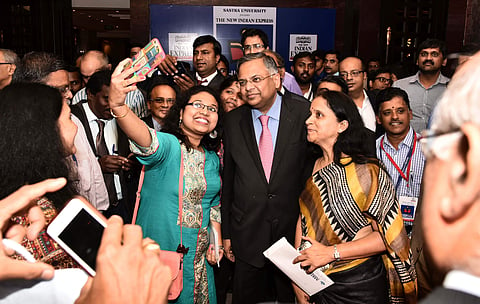

What do we do if 65 per cent of children in the education system will be prepped for jobs that do not yet exist? Newly minted chairman of Tata Sons, N Chandrasekaran minced no words in highlighting the urgency needed to bridge this gap between the education provided and skills needed.
"Because," in his words, "We do not have time!"
Delivering the keynote address at The New Indian Express' ThinkEdu Conclave in Chennai, the chairman of the salt-to-software conglomerate shot out a combination of digital and cultural solutions to fast-track changes a nation with 350 million citizens in an outdated education system needs.
This transformation should revolve around a digital pivot, said the former TCS chairman. He said, "Expanding access to the digital world for children across the country can brush away the twin hurdles of access to education and the quality of content and teaching," before adding, "Both very fundamental problems".
But the solution implemented also needs to ensure that the students in the system now, can be employed when they pass out. "Everybody (globally) will say their education system needs fixing. But, it is much more urgent for us. There are 350 million children who are going through the current system and they cannot wait," he explained.
N Chandrasekaran, Tata Sons Chairman
The solution, from Chandrasekar's point of view, is going 'Phygital'. A combination of utilising our existing physical capabilities in education, enhanced by a "veneer of digital" solutions. The change will also need to be cultural, enabling a multimodal system of education - because schools and colleges alone cannot satisfy the urgency needed. If something is gamified, children learn it (At the snap of a finger). If you put a digital veneer to physical capability, it will bring more access, inclusion and will allow students to be multimodal," pointed out Chandrasekaran.
Alongside this digital enabling, India's systems will need a demystification of specialities, because another crisis already facing us are the humongous shortages - in teachers, in judges, in doctors. "To bring about this convergence, we need to create para-specialists... demystify these professions. Break them down and you see the specialty nature of a profession is very little." Letting others do non-specialist jobs will allow specialists to cater to huge volumes. "This can be done faster and we can fill those demands."
Reflecting on education and healthcare as sectors, Chandrasekaran said that both have long escaped from technological disruptions. "They have long escaped disruption. They have continued doing what they have always done," he pointed out in response to a question from Dr S Vaidhyasubramaniam, Dean - Planning and Development, Sastra University.
Aside from going Phygital, Chandrasekaran also gave other solutions that will need to be implemented in parallel to address the access to education and keeping the quality of the content and teaching up to date. "We need to improve localisation. We have many languages and dialects. Content and access to it and the teaching of that content has to be thoroughly localised," he pointed out.
N Chandrasekaran, Tata Sons Chairman
He also stated that students will need personalisation of content. "Different students have different aptitudes and learning ability. They need a level playing field," he said, pointing out that data analytics can play a big role in personalising education for children, according to their aptitudes.
Chandrasekaran also pointed out that corporates alone cannot try to step up and do this. "The government has a big role to play. Anyone who comes from Tamil Nadu will know the contributions that K Kamaraj (erstwhile Chief Minister) made to education in the state. Both corporates and the government have a role to play here," said Chandrasekaran.
